Bitcoin IRA
Essential Bitcoin IRA Regulations: IRS Guidelines
Leverage IRS guidelines to navigate Bitcoin IRA regulations for tax advantages and compliance – discover key insights for informed decision-making.

Understanding Bitcoin IRA regulations per IRS guidelines is essential for compliance and maximizing tax benefits. Proper documentation of cryptocurrency transactions within an IRA is critical to avoid penalties or audits. Adherence to annual contribution limits and understanding tax implications is key. Reporting fair market values accurately helps with tax calculations. Traditional IRAs defer Capital Gains Tax until withdrawals, while Roth IRAs offer tax-free withdrawals. Managing capital gains tax within a Bitcoin IRA is important for potential savings. Meticulous record-keeping, compliance with age-related rules, and staying informed about IRS guidelines are necessary for tax advantages. Understanding IRS regulations is crucial for informed financial decisions that maximize benefits.
Key Takeaways
- Proper documentation of all Bitcoin IRA transactions is crucial for IRS compliance.
- Understanding and adhering to annual contribution limits is essential for tax benefits.
- Compliance with age-related withdrawal rules helps avoid penalties and maintains account status.
- Adherence to IRS guidelines preserves the tax-advantaged nature of the Bitcoin IRA.
- Staying informed about IRS regulations is crucial for informed financial decision-making.
Reporting Cryptocurrency Activities in IRA
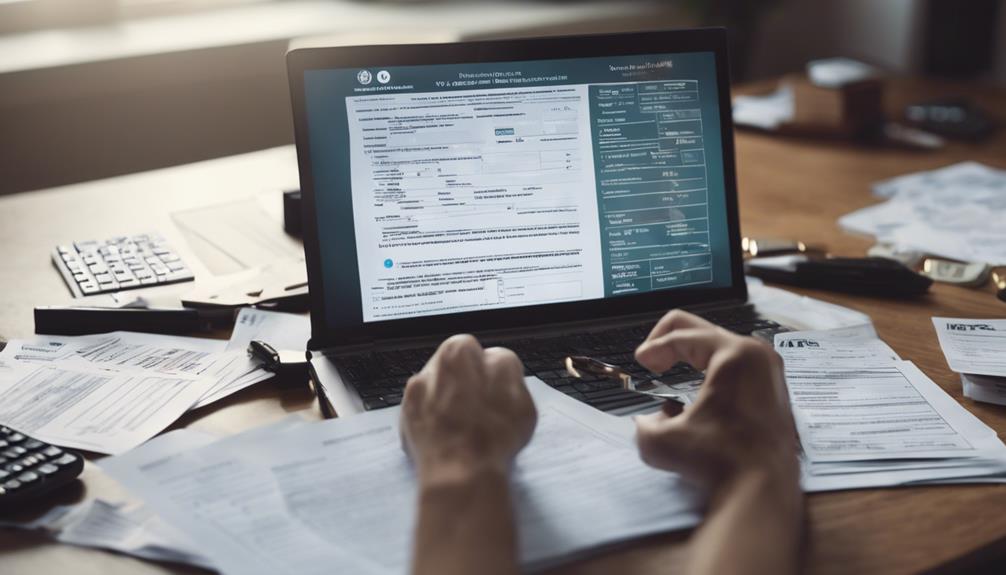
Reporting cryptocurrency activities within an IRA requires careful documentation and accurate disclosure to the IRS. When it comes to digital assets, the tax implications are a crucial factor to take into account.
Failing to properly report cryptocurrency transactions within an IRA can result in significant penalties or even IRS audits. To guarantee tax compliance, it's essential to adhere to IRS guidelines and provide thorough documentation of all digital asset activities within the IRA.
Proper documentation not only helps in staying compliant but also demonstrates transparency in your financial dealings. IRA custodians may offer tools or guidance to assist in reporting these transactions accurately, but ultimately, the responsibility lies with the account holder to ensure that all digital asset activities are reported correctly.
Compliance With IRA Contribution Limits
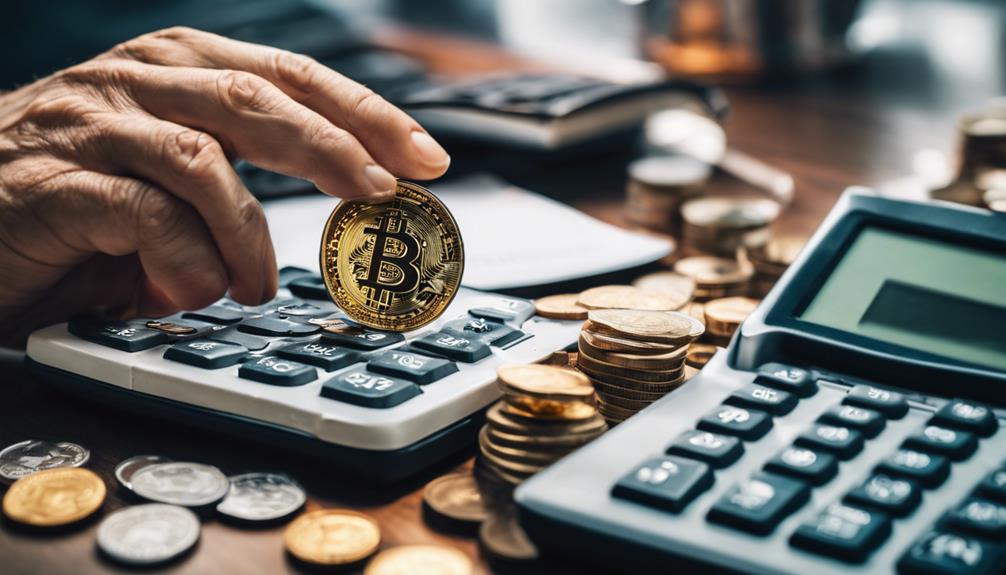
When considering IRA contribution limits, it's important to stay within the set boundaries to avoid penalties and tax implications. Understanding the annual limits, consequences of exceeding them, and the tax ramifications for contributing over the allowed amount is essential for IRA compliance.
Contribution Limit Overview
Understanding the contribution limits for traditional and Roth IRAs is essential for ensuring compliance with IRA regulations.
The current annual contribution limit for both traditional and Roth IRAs stands at $6,000 for individuals under 50 years old. However, individuals aged 50 and over have the opportunity to make catch-up contributions of up to an additional $1,000 per year.
These limits are influenced by age and income, with specific phase-out ranges for various filing statuses.
Contributions to traditional IRAs might be tax-deductible depending on income levels and participation in employer-sponsored retirement plans.
On the other hand, Roth IRA contributions aren't tax-deductible but offer the benefit of tax-free withdrawals during retirement. Understanding these nuances is vital for optimizing your retirement savings strategy.
Exceeding Limit Consequences
By surpassing the annual contribution limit for a Bitcoin IRA, individuals risk facing tax penalties. The 2023 annual contribution limit stands at $6,000 for those under 50 years old, with an option for individuals over 50 to make catch-up contributions of an additional $1,000.
Contributions exceeding this limit can trigger an IRS penalty of 6% on the excess amount. It's vital to adhere to IRA regulations and track contributions accurately to avoid these tax consequences.
Ensuring compliance with contribution limits is essential to prevent unnecessary financial burdens. Understanding the implications of exceeding the limit can help individuals make informed decisions regarding their Bitcoin IRA investments and avoid potential IRS penalties.
Tax Implications for Excess
Exceeding IRA contribution limits can lead to tax penalties and non-compliance with IRS regulations, necessitating prompt corrective actions to rectify the excess contributions.
Contributions exceeding the annual limit are considered excess and can incur a 6% excise tax. To avoid further penalties, taxpayers must promptly correct excess funds by either withdrawing the surplus amount or recharacterizing contributions appropriately.
Understanding the implications of surpassing IRA contribution limits is important to ensure compliance with IRS guidelines and mitigate tax consequences. Being mindful of these regulations and promptly addressing any excess contributions is essential for maintaining a tax-advantaged retirement account.
Understanding MAGI for Tax Deductions

When it comes to IRA tax deductions, understanding MAGI is vital.
MAGI, or Modified Adjusted Gross Income, plays a significant role in determining the amount of tax-deductible contributions allowed in Traditional IRAs.
It's important to calculate MAGI correctly to maximize tax benefits and make informed decisions regarding IRA contributions.
MAGI Definition for Deductions
Understanding MAGI for tax deductions is important for maximizing the benefits of retirement accounts and ensuring compliance with IRS guidelines.
When it comes to MAGI definition for deductions, here are key points to keep in mind:
- MAGI is essential for determining the tax deductibility of contributions in Traditional IRAs.
- Various income sources and adjustments, like student loan interest and rental losses, are factored into MAGI calculations.
- For Roth IRAs, MAGI influences contribution limits, potentially reducing or eliminating the ability to contribute at higher income levels.
Mastering the concept of MAGI is fundamental for making informed decisions about retirement savings and tax planning. By grasping the intricacies of MAGI, individuals can optimize their deductions within the framework of IRS regulations.
Calculating MAGI Correctly
Moving from the MAGI Definition for Deductions to Calculating MAGI Correctly involves precisely evaluating various income sources and deductions to determine tax deductibility in Bitcoin IRAs.
Understanding Modified Adjusted Gross Income (MAGI) is pivotal for gauging eligibility for tax deductions and contributions in a Bitcoin IRA. MAGI encompasses income sources such as wages, interest, dividends, and specific deductions.
In traditional Bitcoin IRAs, MAGI impacts the deductibility of contributions based on participation in a work retirement plan. For Roth Bitcoin IRAs, MAGI influences contribution limits, dictating the maximum amount allowable.
Accurate comprehension of MAGI is essential for optimizing tax benefits and contributions within both traditional and Roth Bitcoin IRAs, ensuring individuals make informed decisions based on their financial circumstances and retirement goals.
Impact on Tax Benefits
Our comprehension of Modified Adjusted Gross Income (MAGI) directly impacts the tax benefits available in traditional Bitcoin IRAs. When considering MAGI in the context of Bitcoin IRAs, it's essential to understand its implications on tax-deductible contributions and contribution limits.
Specifically, MAGI influences the amount of tax-deductible contributions allowed in traditional Bitcoin IRAs, affecting the potential tax benefits that investors can reap. Additionally, MAGI considerations play an important role in determining the deduction limits for contributions to both Traditional Bitcoin IRAs and Roth Bitcoin IRAs.
Taxation of Cryptocurrency in IRAs

Within a Bitcoin IRA, cryptocurrencies are treated as property by the IRS, making them subject to capital gains tax upon sale. This means that any profits realized from the sale of cryptocurrencies within the IRA will be taxed at capital gains rates.
Tax efficiency is an important consideration in managing a cryptocurrency IRA, as tax-free or tax-deferred growth can greatly impact long-term returns. Understanding the potential income tax implications for activities like mining, airdrops, and interest from lending within a cryptocurrency IRA is key.
Early withdrawals from a Bitcoin IRA before age 59½ may lead to taxes and penalties, affecting overall tax efficiency and investment goals. Understanding the differences between Traditional and Roth IRAs is essential, as they offer varying tax implications and benefits for investors.
Guidelines for Traditional IRA Taxes
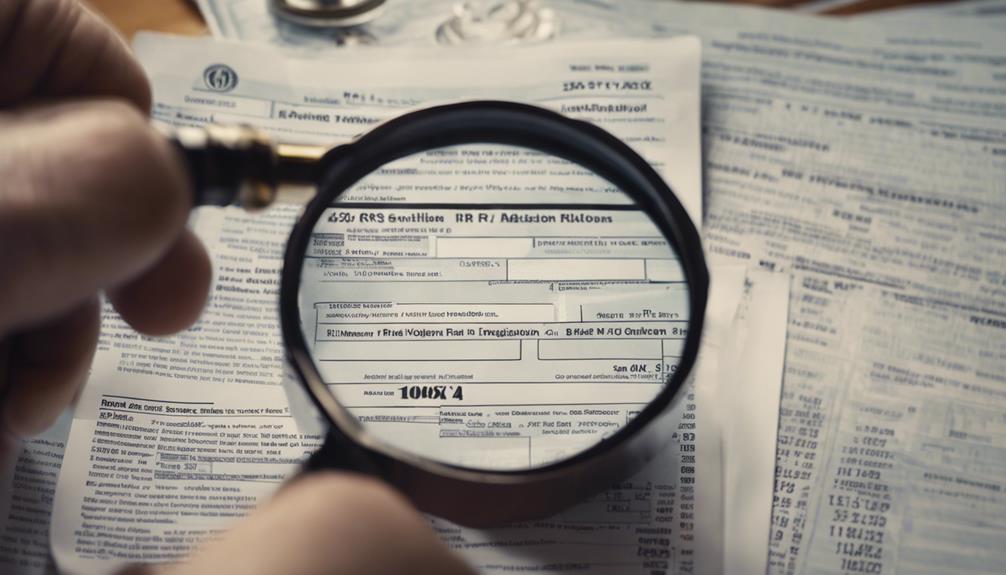
When considering the tax implications of a Traditional IRA, it's important to understand the guidelines surrounding contributions and withdrawals. Contributions to a Traditional IRA are tax-deductible within certain limits established by the IRS, providing an immediate tax benefit to investors.
Unlike regular investment accounts, investments held within a Traditional IRA aren't subject to Capital Gains Tax until you make withdrawals. Withdrawals from a Traditional IRA during retirement are treated as taxable income, with the tax rate dependent on your tax bracket at that time.
This setup can be advantageous for individuals expecting to be in lower tax brackets post-retirement since they may pay less tax on their withdrawals. By strategically utilizing Traditional IRA contributions, individuals can also lower their current taxable income, potentially reducing their tax burden.
Understanding these IRS guidelines and regulations is essential for maximizing the tax benefits of a Traditional IRA.
Guidelines for Roth IRA Taxes
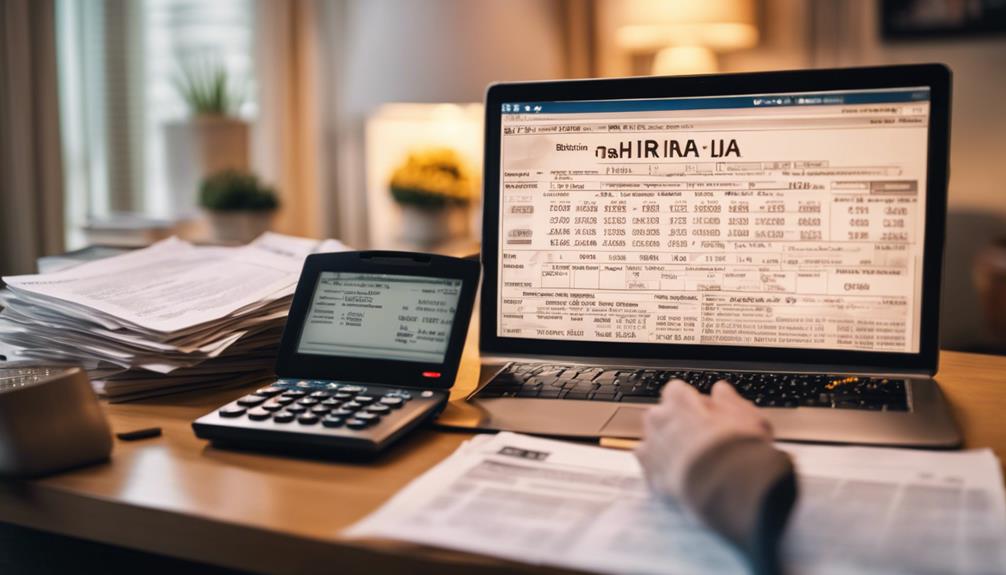
Moving from the guidelines for Traditional IRA taxes, now let's shift our focus to understanding the tax regulations surrounding Roth IRAs.
Roth IRA contributions aren't tax-deductible, but the advantage lies in tax-free withdrawals during retirement. This includes any gains from cryptocurrency investments within a Roth Bitcoin IRA. For individuals expecting to be in higher tax brackets during retirement, Roth IRAs offer a strategic way to avoid taxation on distributions.
Contributions to a Roth Bitcoin IRA are made using after-tax dollars, providing tax benefits down the line. These accounts facilitate long-term retirement planning by allowing investments to grow tax-free. Choosing a Roth IRA can be a wise financial move for those looking to maximize their tax advantages and secure a stable financial future.
Understanding the nuances of Roth IRA tax regulations is essential for making informed decisions when planning for retirement.
Reporting Requirements for Bitcoin IRA

To abide by IRS regulations, reporting cryptocurrency transactions within a Bitcoin IRA is necessary. Proper reporting is vital to guarantee compliance with IRS guidelines for Bitcoin IRA investments. Here are some key aspects of reporting requirements for a Bitcoin IRA:
- Form 5498: This form is used to report annual contributions and rollovers within a Bitcoin IRA. It provides details on the amounts contributed to the account, aiding the IRS in tracking the flow of funds.
- Cryptocurrency Transactions: All transactions involving cryptocurrencies within a Bitcoin IRA must be meticulously documented and reported. This includes details of purchases, sales, exchanges, and any distributions made from the account.
- Fair Market Values: Reporting the fair market values of cryptocurrencies held within the Bitcoin IRA is essential for accurate tax calculations. These values determine the gains or losses incurred when assets are disposed of or distributed.
Failing to comply with the reporting requirements for a Bitcoin IRA may result in penalties or trigger IRS audits, underscoring the importance of meticulous record-keeping and transparency.
Capital Gains Tax for Bitcoin IRAs
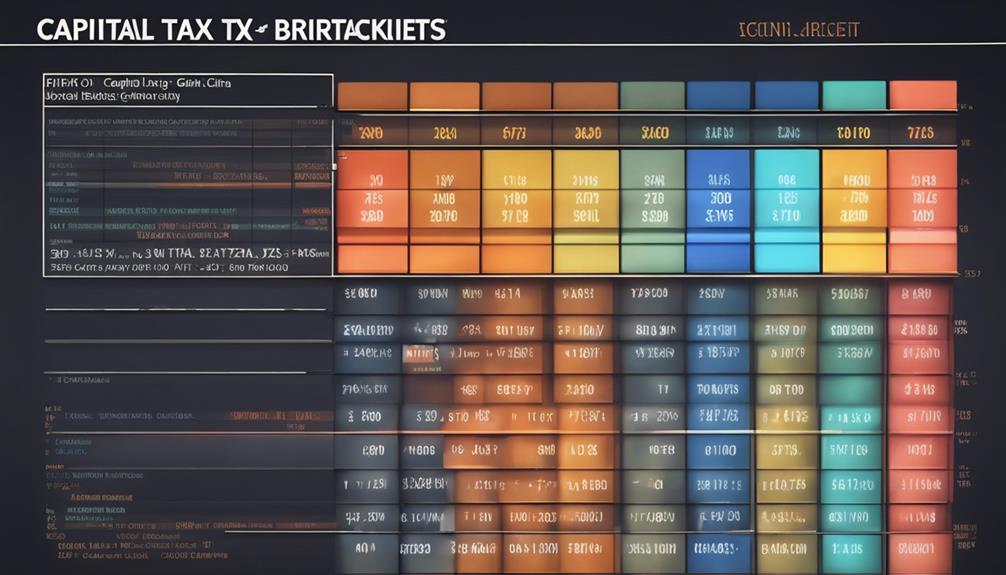
Managing capital gains tax implications is an essential aspect of effectively handling Bitcoin IRAs. When selling Bitcoin within an IRA for a profit, capital gains tax becomes applicable.
Compared to regular cryptocurrency trading, Bitcoin IRAs offer potential tax savings on capital gains. Gains from Bitcoin IRA investments are taxed at long-term capital gains rates if held for more than a year.
The tax rates vary depending on the individual's tax bracket and the duration for which the Bitcoin is held within the IRA. Properly managing Bitcoin IRA transactions can help minimize capital gains tax obligations.
By adhering to IRS guidelines and understanding the tax implications associated with Bitcoin IRAs, investors can strategically plan their investments to optimize tax savings and maximize profit.
It's essential to stay informed about the tax regulations surrounding Bitcoin IRAs to make informed financial decisions and comply with IRS requirements.
Adherence to IRS Regulations for Bitcoin IRA
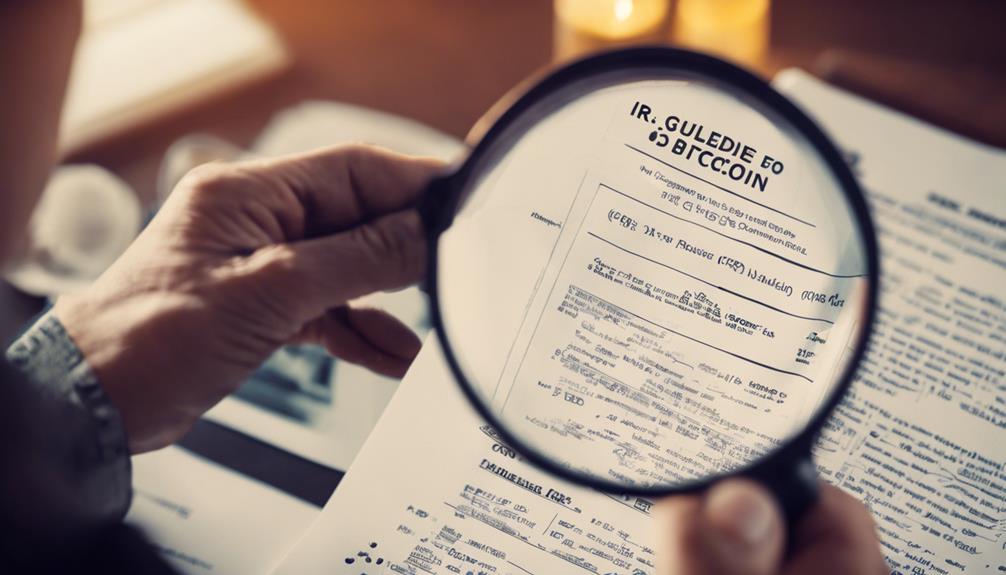
When guaranteeing compliance with IRS regulations for Bitcoin IRAs, we prioritize understanding and adhering to the rules governing contributions, withdrawals, and reporting. Proper adherence to these guidelines is vital for maintaining the tax-advantaged status of your account and avoiding potential penalties or disqualification. To guarantee compliance, we focus on:
- Record-keeping: Maintaining accurate and detailed records of all transactions and activities related to your Bitcoin IRA is essential to demonstrate adherence to IRS regulations.
- Annual contribution limits: Understanding the maximum amount you can contribute to your Bitcoin IRA each year is key to staying within the IRS guidelines and maximizing your tax benefits.
- Withdrawal rules: Adhering to the age-related withdrawal rules set forth by the IRS helps ensure that you avoid any penalties or tax implications when accessing funds from your Bitcoin IRA.
Frequently Asked Questions
What Are the IRS Rules for Bitcoin?
We must understand IRS rules for Bitcoin.
The IRS classifies Bitcoin as property, so each sale triggers potential capital gains tax.
Bitcoin IRAs offer tax advantages, but early withdrawals may incur taxes.
Compliance with IRS regulations is essential for transactions.
Is Bitcoin Allowed in Ira?
Yes, Bitcoin is allowed in an IRA, providing potential tax advantages. The IRS permits Bitcoin IRAs under specific regulations. Depending on the IRA type, Bitcoin can grow tax-free or tax-deferred, helping individuals save on capital gains taxes.
Bitcoin IRAs are subject to IRS guidelines for contributions, withdrawals, and reporting. It's important to adhere to these regulations to maximize the benefits of investing in Bitcoin within an IRA.
Do You Pay Taxes on Bitcoin Ira?
Yes, taxes are applicable to Bitcoin IRAs. The type of Bitcoin IRA you choose influences the taxation process. Traditional Bitcoin IRAs allow tax-deductible contributions, reducing taxable income.
Roth Bitcoin IRAs don't offer tax deductions on contributions but allow tax-free withdrawals during retirement. Capital gains tax on cryptocurrency in a Bitcoin IRA is deferred until distributions are made.
Early withdrawals may incur taxes and penalties, similar to traditional retirement accounts.
What Are the Tax Rules for Bitcoin?
When it comes to Bitcoin, understanding the tax rules can be essential. The IRS treats Bitcoin as property, subject to capital gains tax upon sale or exchange.
Additionally, income tax may apply to activities like mining, airdrops, and interest from lending Bitcoin. Understanding these rules is vital for managing your taxes efficiently and staying compliant with the IRS regulations.
How do IRS guidelines impact the benefits of using the Bitcoin IRA Financial Services Platform?
When considering the benefits of Bitcoin IRA financial, it’s crucial to understand how IRS guidelines impact its use. By adhering to IRS rules regarding retirement accounts, the platform ensures legitimacy and security for users. These guidelines also help protect the tax advantages and flexibility of investing in Bitcoin through the IRA.
Conclusion
In conclusion, following essential IRS guidelines for Bitcoin IRAs is important for compliance and tax efficiency. Reporting cryptocurrency activities, adhering to contribution limits, understanding MAGI for deductions, and knowing the taxation rules are key factors.
By staying informed and following regulations, investors can navigate the complexities of Bitcoin IRAs with ease. Remember, exaggerating the importance of IRS guidelines may seem like a stretch, but it's truly essential for financial success in the cryptocurrency domain.
William is the voice of The Liberty Portfolio within our community. He manages all interactions with our readers through social media and website forums, ensuring that every query is answered and feedback is incorporated into our ongoing improvements. William’s role is crucial in building and maintaining strong relationships with our audience, fostering an engaging and supportive online environment for everyone interested in better managing their retirement planning.
Bitcoin IRA
Signs of a Legitimate Bitcoin IRA Provider
Yearning for a secure future? Discover the essential indicators of a trustworthy Bitcoin IRA provider for sound investment decisions.

When assessing a Bitcoin IRA provider, look for strong industry reputation, clear fee breakdowns, diverse investment options, and regulatory compliance. Confirm they have a proven track record, transparent fee structures, and accreditation. Opt for providers offering a range of investment options beyond Bitcoin, with expertise in digital assets and diversification. Check for adherence to IRS regulations, transparent disclosure of fees, and robust security measures. Positive client reviews, responsive customer service, and professionalism are key indicators of a reliable provider. Prioritize trustworthiness, reliability, and user-friendly platforms. Find out more about signs of a legitimate Bitcoin IRA provider.
Key Takeaways
- Strong industry reputation and compliance with regulatory bodies.
- Transparent fee structure with clear breakdowns.
- Diverse investment options beyond Bitcoin.
- Adherence to legal requirements and IRS regulations.
- Robust security protocols and high client satisfaction.
Industry Reputation and Track Record

When selecting a Bitcoin IRA provider, we prioritize those with a proven track record and strong industry reputation. Managing IRA investments involving crypto assets requires expertise and experience. A provider with a solid track record demonstrates reliability and proficiency in maneuvering the complexities of digital currencies within retirement accounts. Longevity in the industry is also essential; it signifies stability and a deep understanding of the evolving crypto landscape. By choosing a reputable provider, we can entrust our IRA investments in crypto assets to professionals who've a history of success.
Another critical aspect to take into account is regulatory compliance. Ensuring that the Bitcoin IRA provider operates within legal frameworks and meets industry standards is essential for safeguarding our investments. Accreditation adds an extra layer of assurance, indicating that the provider adheres to strict guidelines and best practices. By prioritizing regulatory compliance and accreditation, we can invest in crypto assets through our IRAs with confidence, knowing that our financial interests are protected.
Transparent Fee Structure and Information
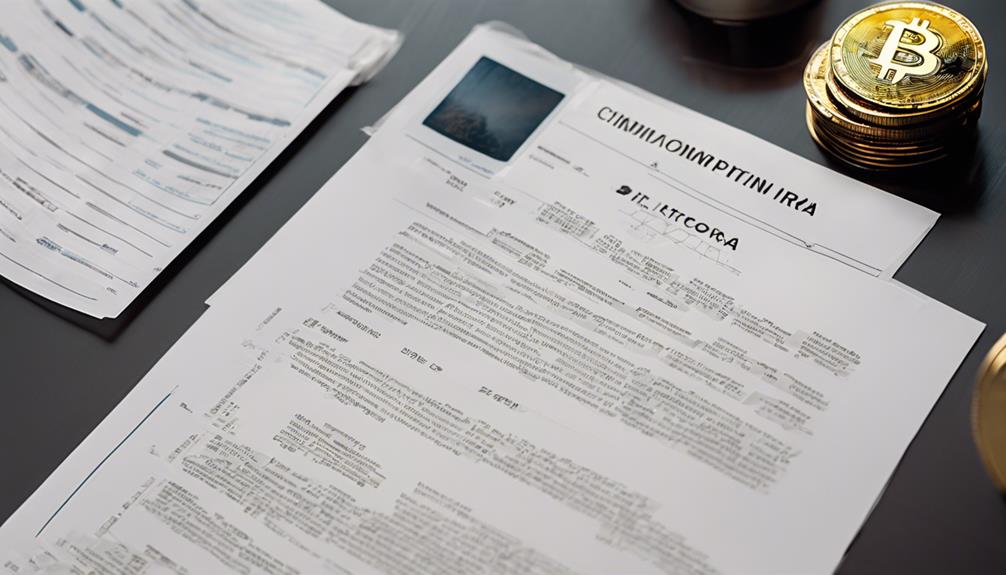
When evaluating Bitcoin IRA providers, it's crucial to look for clear fee breakdowns and detailed disclosure of costs. Understanding transaction fees, account maintenance fees, and other charges upfront helps investors make informed decisions.
Transparent providers avoid hidden fees, providing a straightforward overview of all expenses related to managing a Bitcoin IRA.
Clear Fee Breakdown
Legitimate Bitcoin IRA providers present investors with a clear fee breakdown that outlines transaction fees, account maintenance costs, and any other relevant expenses. When evaluating a Bitcoin IRA provider, look for a transparent fee structure that guarantees you're fully aware of the costs involved.
Here are some key aspects to take into account in a clear fee breakdown:
- Detailed transaction fees for buying and selling Bitcoin within the IRA.
- Account maintenance costs to keep your Bitcoin IRA active.
- Any additional charges related to account management or services.
- Transparency in fee disclosure to avoid surprises.
- Understanding the complete cost structure for managing your Bitcoin IRA.
Detailed Disclosure of Costs
A detailed disclosure of costs in a transparent fee structure and information is essential for investors considering a Bitcoin IRA. Legitimate providers offer clarity on fees such as transaction costs and maintenance charges, ensuring investors are well-informed. Transparent fee structures build trust by revealing all expenses linked to managing a Bitcoin IRA.
It's vital for investors to have upfront fee disclosures to prevent surprises and make educated investment choices. Accessible and understandable information on fees allows investors to assess the cost-effectiveness of a Bitcoin IRA provider. Legitimate providers align their fee structures with industry standards and regulations, boosting credibility and trust.
Clear Investment Options

Effective diversification of retirement portfolios hinges on the availability of a diverse range of transparent investment options, including various cryptocurrencies like Bitcoin, Ethereum, and Litecoin. A legitimate Bitcoin IRA provider guarantees clear and varied investment choices to empower clients in building a robust retirement portfolio.
Here are key aspects to ponder when evaluating the investment options offered by a Bitcoin IRA provider:
- Wide Range of Cryptocurrencies: Make sure the provider offers a selection of top digital assets beyond just Bitcoin.
- Transparent Investment Information: Look for clear and easily accessible details about each investment option.
- Expertise in Cryptocurrency Space: Seek a provider that demonstrates knowledge and experience in managing digital assets.
- Commitment to Diversification: Opt for a provider that encourages diversification across different crypto assets.
- Client-Centric Approach: Choose a provider that prioritizes meeting the diverse investment needs of clients.
Registration With Regulatory Bodies

Ensuring regulatory compliance is essential when considering a Bitcoin IRA provider. Verifying their licensing with regulatory bodies like the SEC or CFTC is imperative for investor protection.
This step confirms the provider's transparency and adherence to industry standards.
Regulatory Compliance
In ensuring compliance with financial regulations and investor protection laws, legitimate Bitcoin IRA providers are registered with regulatory bodies like the SEC and the CFTC. This registration signifies a commitment to transparency and adherence to industry standards.
When considering a Bitcoin IRA provider, verifying their registration status with relevant regulatory agencies is vital for investor security. Here are some key points related to regulatory compliance:
- Registration demonstrates accountability and adherence to financial regulations.
- It guarantees investor protection and transparency in operations.
- Compliance with regulatory bodies indicates commitment to best practices.
- Investors should prioritize providers that are registered with the SEC and the CFTC.
- Regulatory oversight helps maintain the integrity of the Bitcoin IRA industry.
Licensing Verification
Legitimate Bitcoin IRA providers demonstrate their commitment to compliance by registering with regulatory bodies such as the SEC or FINRA. Verifying that your IRA custodian is licensed by these reputable organizations is vital for investor protection and regulatory compliance. By confirming the licensing status of a Bitcoin IRA provider through official regulatory websites, investors can mitigate risks associated with unregistered or unlicensed entities. Operating within the oversight of the SEC or FINRA provides a level of assurance and accountability that freedom-seeking individuals value when securing their financial future. Below is a table highlighting the significance of licensing verification:
| Importance of Licensing Verification |
|---|
| Ensures Adherence to Regulations |
| Investor Protection |
| Legitimacy and Credibility Assurance |
| Mitigates Risks Associated with Unregistered Providers |
Compliance With Legal Requirements

Adhering to IRS regulations is a fundamental requirement for reputable Bitcoin IRA providers. Ensuring compliance with legal requirements, including SEC guidelines, is essential for offering cryptocurrency investments within an IRA.
Here are some key points to keep in mind when evaluating a Bitcoin IRA provider:
- Transparent Disclosure of Fees: Legitimate providers openly disclose all fees associated with investing in cryptocurrencies through an IRA.
- Clear Communication of Risks: Reputable companies make sure that clients fully understand the risks involved in cryptocurrency investments within an IRA.
- Tax Implications Awareness: Legitimate providers educate clients on the tax implications of investing in cryptocurrencies through an IRA.
- Industry Standards Adherence: Compliance with industry standards demonstrates a commitment to professionalism and quality service.
- Legal Requirements Fulfillment: Meeting all legal obligations for offering cryptocurrency investments within an IRA showcases a provider's trustworthiness and reliability.
Client Asset Protection Measures

Utilizing advanced encryption technologies and secure offline storage solutions is essential for safeguarding client assets in a Bitcoin IRA. Legitimate providers implement robust security measures to protect client asset information from potential threats. By employing encryption technologies, sensitive data is encoded and secured, reducing the risk of unauthorized access. Additionally, utilizing secure offline storage solutions like cold storage in top-tier facilities enhances client asset protection by minimizing exposure to online vulnerabilities.
These client asset protection measures are designed to prevent hacking attempts and guarantee the safety of funds within a Bitcoin IRA. Reputable providers prioritize the security of client assets, adhering to strict regulatory guidelines to maintain a secure environment. By implementing multi-layer security protocols and encryption technologies, they offer peace of mind to clients, knowing that their investments are safeguarded against potential risks. The combination of secure offline storage solutions and advanced security measures underscores the commitment of legitimate Bitcoin IRA providers to protect client funds.
Security Protocols and Safeguards

We guarantee that our Bitcoin IRA providers exceed expectations in securing your digital assets.
From offline cold storage to multi-encryption encoding, your transactions are fortified with high-quality security measures.
Identity verification procedures are meticulously implemented to safeguard against any unauthorized access.
Secure Storage Measures
Implementing a robust security framework is paramount for legitimate Bitcoin IRA providers when it comes to safeguarding digital assets through secure storage measures. To guarantee the utmost protection, providers employ the following secure storage measures:
- Cold Storage: Digital assets are stored offline to prevent hacking and unauthorized access.
- Multi-encryption Encoding: Utilizing advanced encryption techniques to secure transactions and data.
- End-to-end Insurance Coverage: Providing inclusive insurance to cover potential losses.
- State-of-the-art Security Measures: Implementing cutting-edge technologies to thwart cyber threats.
- Secure Locations: Storing assets in offline locations like nuclear bunkers for added protection.
Encryption Technologies Used
Industry-standard encryption technologies like multi-encryption encoding play a crucial role in guaranteeing the security of digital assets stored by legitimate Bitcoin IRA providers. By using cutting-edge encryption methods, these providers secure transactions and protect client investments. The table below highlights some of the encryption technologies commonly used by reputable Bitcoin IRA providers:
| Encryption Technology | Description | Benefits |
|---|---|---|
| Multi-Encryption | Utilizes multiple encryption layers | Enhanced security for digital assets |
| AES Encryption | Advanced Encryption Standard | Safeguards sensitive financial data |
| SSL/TLS Protocol | Secure Sockets Layer/Transport Layer Security | Ensures secure online transactions |
These encryption technologies work together to maintain the confidentiality and integrity of client information, reflecting the commitment of legitimate Bitcoin IRA providers to robust security measures.
Identity Verification Procedures
Utilizing strict identity verification procedures is essential for ensuring the security of account holders with legitimate Bitcoin IRA providers. These procedures include:
- Multi-factor authentication to add layers of security to accounts.
- KYC (Know Your Customer) verification to confirm the identity of account holders.
- Anti-money laundering checks to prevent illicit financial activities.
- Secure document uploads for safely submitting sensitive information.
- Biometric verification and real-time monitoring for enhanced security measures.
Client Satisfaction and Reviews

Based on online reviews and ratings from platforms like Trustpilot and BBB, we can assess client satisfaction with Bitcoin IRA providers. Positive feedback from clients is important in determining a legitimate provider. Look for comments on customer service, ease of use, security measures, and investment options to gauge satisfaction levels.
High ratings and testimonials from happy customers can confirm the credibility and reputation of a Bitcoin IRA company. Consistent positive feedback and recommendations are strong indicators of a reliable provider in the Bitcoin IRA market. As clients seeking financial freedom, it's vital to take into account the experiences of others before choosing a Bitcoin IRA provider.
Professionalism and Customer Service

Ensuring a high level of professionalism and exceptional customer service sets apart legitimate Bitcoin IRA providers in the industry. When dealing with Bitcoin IRA companies, the quality of customer service can make a significant difference in your overall experience. Here are some key indicators of professionalism and customer service from reputable providers:
- Clear Communication: Legitimate Bitcoin IRA companies maintain professional websites with transparent information on services and fees.
- Responsive Support: They offer customer service through various channels like phone, email, and live chat for timely assistance.
- Knowledgeable Representatives: These providers have well-trained staff who can address inquiries and offer detailed guidance, especially for those new to Bitcoin IRAs.
- Transparency: Legitimate companies are open about their custodian partnerships and security measures, instilling trust in their clients.
- Client-Centric Approach: They prioritize client satisfaction and work diligently to uphold professionalism in all interactions, ensuring a positive customer experience.
Trustworthiness and Reliability

With a myriad of Bitcoin IRA providers in the market, establishing trustworthiness and reliability is paramount for investors seeking to safeguard their digital assets.
When considering a Bitcoin IRA provider, it's important to look for a company that prioritizes security measures and offers insurance coverage to protect your investments. Additionally, make sure that the provider utilizes offline cold storage for digital assets, minimizing the risk of hacking and unauthorized access.
A secure and user-friendly trading platform is also essential for managing investments effectively. Checking customer reviews and the overall reputation of the Bitcoin IRA company can provide valuable insights into its trustworthiness and reliability.
Frequently Asked Questions
Is Bitcoin IRA Legitimate?
Yes, Bitcoin IRA is legitimate. They've been in operation since 2016 and offer a secure platform for cryptocurrency investments. With over 60 types of cryptocurrencies supported, they provide a wide range of options for investors.
Additionally, Bitcoin IRA offers $700 million in insurance protection for digital assets. Their user-friendly setup and trading process, along with offline digital asset storage, make them a reliable and trustworthy choice for investors like us.
How Do You Know if Someone Is Scamming You With Bitcoin?
To avoid Bitcoin scams, we recommend verifying sources and avoiding requests for suspicious actions like downloading apps or transferring funds to unknown wallets.
Legitimate providers won't demand hefty deposits for fund releases or direct you to ATMs for transactions. Stay vigilant for signs like these to protect your assets and financial security.
Trustworthy Bitcoin IRA companies prioritize transparency and secure practices, ensuring your investments are safe and legitimate.
Who Offers Bitcoin Iras?
We can find Bitcoin IRA options from various providers like iTrustCapital, Bitcoin IRA, BitIRA, Equity Trust, and Broad Financial. Each has its own set of features such as diverse cryptocurrency support, insurance protection, secure storage, and self-directed options.
Costs range from percentage-based fees to minimum investment requirements. Researching these providers thoroughly can help individuals choose the best fit for their Bitcoin IRA needs.
How Can You Tell the Difference Between Real and Fake Bitcoins?
When distinguishing between real and fake bitcoins, it's essential to verify transactions on the blockchain ledger.
Real Bitcoins are decentralized digital currencies with encryption and security features, while fake ones lack these safeguards.
Legitimate Bitcoin IRAs comply with IRS regulations and work with reputable custodians, ensuring transparency and security.
Conclusion
In summary, when selecting a Bitcoin IRA provider, it's important to look for signs of legitimacy such as:
- a strong industry reputation,
- transparent fees,
- clear investment options,
- regulatory registration,
- legal compliance,
- robust security measures,
- positive client reviews,
- professionalism, and
- reliability.
By considering these factors, investors can guarantee they're working with a trustworthy and reliable provider for their cryptocurrency retirement savings.
Nancy oversees all content creation at The Liberty Portfolio. Her exceptional skill in translating complex financial concepts into clear, actionable advice makes her an invaluable asset to the team. Under her guidance, our content is informative and engaging, ensuring that readers from all backgrounds can understand and apply our advice. Nancy’s leadership in the content team ensures that our educational materials meet high standards of clarity and accuracy.
Bitcoin IRA
The Ultimate Bitcoin IRA Self-Custody Guide
Start your journey to financial security with the ultimate Bitcoin IRA self-custody guide, unlocking secrets to tax-free gains and strategic asset protection.

Explore the key to securing your financial future with the ultimate Bitcoin IRA self-custody guide. Delve into tax advantages, self-custody strategies, risk management, and choosing the right provider. Benefit from tax-free gains, diversify your retirement portfolio, and protect assets with self-custody. Control your private keys, store offline with hardware wallets, and enhance security with multisig setups. Safeguard investments by diversifying, setting stop-loss orders, and embracing long-term strategies. Select the best provider based on fees, available cryptocurrencies, and investment goals. Make informed decisions for financial security and investment potential. Uncover essential insights for maximizing your Bitcoin IRA experience.
Key Takeaways
- Gain control over private keys for security.
- Use hardware wallets for offline storage.
- Implement multisig setups for added security.
- Consider secure storage solutions like safe deposit boxes.
- Self-custody offers control and eliminates third-party risk.
Understanding Bitcoin IRAs

Bitcoin IRAs offer a tax-advantaged way for individuals to invest in bitcoin within their retirement accounts. This setup potentially allows for tax-free gains until withdrawal, providing a unique opportunity for those looking to diversify their investment options within a retirement portfolio.
Unlike traditional IRAs, Bitcoin IRAs involve digital assets like bitcoin, which come with their own set of regulations and custodian processing requirements. One key feature of Bitcoin IRAs is the ability for self-custody, giving investors more control over their assets compared to traditional retirement accounts.
Bitcoin IRA Tax Implications

Considering the tax implications of holding digital assets in an IRA, one must understand how contributions and withdrawals are taxed depending on the type of IRA account.
- Bitcoin IRA contributions are typically made with pre-tax dollars in a Traditional IRA or post-tax dollars in a Roth IRA.
- Withdrawals from a Traditional Bitcoin IRA are taxed as ordinary income, while Roth Bitcoin IRA withdrawals are tax-free if certain conditions are met.
- Bitcoin IRA investments can grow tax-free until withdrawal, providing potential tax advantages over traditional investment accounts.
- Bitcoin IRA owners may face penalties for early withdrawals before the age of 59 1/2, similar to penalties for early withdrawals from traditional IRAs.
- Consult a tax advisor to understand the specific tax implications of holding Bitcoin in an IRA and ensure compliance with IRS regulations.
Understanding these tax implications is important for making informed decisions about managing your Bitcoin IRA to optimize your financial outcomes while avoiding unnecessary penalties and tax burdens.
Self-Custody Strategies for Bitcoin IRAs

When self-custodying a Bitcoin IRA, investors gain control over their private keys and secure their assets, eliminating third-party risk. By holding your Bitcoin in a self-custody setup, you directly manage your digital currency without relying on intermediaries. Utilizing hardware wallets, such as Ledger or Trezor, offers a secure way to store your private keys offline, safeguarding your Bitcoin against online threats.
Multisig setups, where multiple private keys are required to authorize transactions, provide an extra layer of security against single points of failure. Secure storage solutions like safe deposit boxes or secure safes physically protect your hardware wallets from theft or damage. These self-custody strategies not only enhance the security and privacy of your Bitcoin IRA but also reduce the need for third-party custodians, giving you greater independence and control over your retirement funds. Properly educating yourself on these best practices is essential for securely managing your Bitcoin within an IRA.
Managing Risk in Bitcoin IRAs

To effectively safeguard our retirement savings in Bitcoin IRAs, understanding and implementing risk management strategies is paramount. When managing risk in Bitcoin IRAs, we must consider various factors to protect our investments and guarantee long-term financial security. Here are five key practices to help navigate the volatile world of cryptocurrency within your IRA:
- Diversification: Spreading investments across different assets can help reduce overall risk exposure.
- Setting Stop-Loss Orders: These automated sell orders can limit potential losses by selling a cryptocurrency when it reaches a predetermined price.
- Regular Portfolio Reviews: Consistently evaluating and adjusting your portfolio can help ensure it aligns with your risk tolerance and investment goals.
- Monitoring Market Trends and Regulatory Changes: Staying informed about industry developments can inform your investment decisions and help you adapt to changing market conditions.
- Embracing Long-Term Investment Strategies: Patience and a focus on the long haul can help weather short-term market fluctuations and maximize returns over time.
Choosing the Right Bitcoin IRA Provider

In safeguarding our retirement savings in Bitcoin IRAs, the selection of the right provider plays a significant role in ensuring financial security and optimizing investment potential. When choosing the best Bitcoin IRA account, it's important to take into account factors such as fees, types of IRAs, available cryptocurrencies, and investment goals.
Providers like BitcoinIRA offer a wide range of over 60 cryptocurrencies, while BitIRA provides access to 17 without charging any fees. CoinIRA specializes in Roth IRAs and offers 17 cryptocurrencies. iTrustCapital requires a minimum deposit of $1,000 with a 1% transaction fee, whereas Swan Bitcoin has no minimum deposit requirement but charges a 0.99% transaction fee.
Evaluating tax benefits, retirement funds, and reinvestment options provided by different Bitcoin IRA providers is vital for maximizing gains and aligning with your financial goals. Research and compare offerings to find a provider that best suits your needs for a secure and prosperous retirement.
Frequently Asked Questions
Can You Self Custody Bitcoin in an Ira?
Yes, we can self-custody Bitcoin in an IRA. By utilizing a Checkbook Control IRA structure, we directly manage our Bitcoin holdings without custodial approval. Through an LLC owned by the IRA, we gain control, enabling autonomous investment decisions.
This approach enhances security and control over our retirement savings, providing direct access to digital assets. Self-custodying Bitcoin in an IRA empowers individuals to manage their investments independently.
Is Bitcoin IRA Legitimate?
Yes, Bitcoin IRAs are legitimate retirement accounts approved by the IRS. They provide tax advantages similar to traditional IRAs, allowing tax-free growth and potential deductions.
Leading companies like Unchained Capital offer compliant structures for Bitcoin IRAs, ensuring regulatory compliance. Consultation with financial advisors can confirm the legitimacy and benefits of a Bitcoin IRA for retirement planning.
What Is the Minimum Deposit for a Bitcoin Ira?
The minimum deposit for a Bitcoin IRA is $6,000 with Unchained Capital. This requirement guarantees proper diversification and security within the IRA.
It sets a standard for entry into a Bitcoin IRA and signifies a commitment to long-term investment goals.
Meeting this deposit amount is essential to start building a Bitcoin IRA with Unchained Capital.
How Do I Buy Bitcoins With Self-Directed Ira?
To buy bitcoins with a self-directed IRA, we need to select a trusted custodian supporting cryptocurrency investments. Once the IRA is ready, we can purchase bitcoins through an approved crypto exchange.
This allows for potential growth of our investment within a tax-advantaged retirement account. It's essential to follow regulations and choose a reliable custodian to navigate the process smoothly and securely.
Conclusion
To wrap up, self-custody plays a vital role in managing a Bitcoin IRA. Understanding the tax implications and choosing the right provider are essential steps in protecting your investment.
By implementing effective self-custody strategies and managing risk diligently, you can secure your financial future with confidence. Choose wisely, stay informed, and take control of your Bitcoin IRA to maximize its potential for growth and security.
Nancy oversees all content creation at The Liberty Portfolio. Her exceptional skill in translating complex financial concepts into clear, actionable advice makes her an invaluable asset to the team. Under her guidance, our content is informative and engaging, ensuring that readers from all backgrounds can understand and apply our advice. Nancy’s leadership in the content team ensures that our educational materials meet high standards of clarity and accuracy.
Bitcoin IRA
A Step-By-Step Guide to Buying Bitcoin in Your IRA
Uncover the essential steps to purchasing Bitcoin in your IRA for tax advantages and diversification, setting the stage for financial growth and security.

To buy Bitcoin in your IRA, first select a custodian allowing crypto investments. Verify IRS compliance and contribution limits. Choose a platform with low fees and security. Place an order through your custodian, confirm details, and monitor your investment. Understand tax implications and risks. Seek advice for effective financial planning. Bitcoin IRAs offer tax advantages and diversification, yet carry market risks. Securely store Bitcoin within your IRA and acknowledge complexities compared to traditional accounts. Mastering these steps is key to maximizing benefits.
Key Takeaways
- Select an IRA custodian allowing cryptocurrency investments.
- Verify compliance with IRS regulations and contribution limits.
- Choose a reputable platform with secure storage.
- Execute Bitcoin purchase through the custodian.
- Monitor investment performance and adjust strategy.
Setting Up a Self-Directed IRA

When setting up a self-directed IRA for investing in Bitcoin, the first step is selecting a custodian that allows cryptocurrency investments. With a self-directed IRA, individuals have the freedom to choose alternative assets like Bitcoin for their retirement portfolio.
This option provides more control over investment decisions, enabling us to capitalize on the potential of cryptocurrency. However, it's important to ensure compliance with IRS regulations and contribution limits to avoid penalties.
By partnering with a custodian that supports Bitcoin investments, we can navigate the complexities of setting up a self-directed IRA smoothly. Understanding the rules and regulations governing self-directed IRAs is essential to make informed investment choices and maximize our retirement savings.
Funding Your IRA Account

When funding your IRA account, it's important to be aware of contribution limits and choose investment options wisely. Verify that your IRA account allows for cryptocurrency investments like Bitcoin, and make sure the company is licensed to handle such investments.
Understanding the associated fees is essential before investing in Bitcoin through your IRA.
IRA Contribution Limits
For individuals looking to fund their IRA accounts, it's essential to be aware of the contribution limits set for 2021. In this year, the maximum contribution to an IRA is $6,000 for those under 50 years old and $7,000 for individuals 50 and older.
It's important to keep in mind that these contributions must come from earned income like wages, salaries, bonuses, and commissions. When deciding between a Traditional IRA and a Roth IRA, remember that Traditional IRAs offer tax-deferred growth, while Roth IRAs provide tax-free withdrawals during retirement.
Additionally, those aged 50 and above can make catch-up contributions, allowing them to contribute extra funds beyond the standard limits. Understanding these limits can help you make informed decisions about your retirement savings.
Choosing Investment Options
To diversify your IRA portfolio and explore alternative investment opportunities, consider funding your account with Bitcoin. You can choose from various investment options such as contributing directly to your crypto-friendly IRA, transferring funds from existing retirement accounts, or rolling over funds from traditional IRAs or 401(k) plans into a self-directed IRA for Bitcoin investments.
Keep in mind the contribution limits set at $6,000 for individuals under 50 and $7,000 for those over 50 in 2022. Before proceeding, assess the tax implications and fees associated with funding your IRA for Bitcoin investments. Understanding these factors can help you make informed decisions and maximize the benefits of incorporating Bitcoin into your retirement savings strategy.
Choosing a Platform or Provider

Selecting the right platform or provider is vital when maneuvering the process of purchasing Bitcoin in your IRA. When choosing an IRA provider for your cryptocurrency investment, consider factors like fees, security features, and the range of cryptocurrencies available. Look for providers that offer seamless integration with reputable exchanges to facilitate smooth transactions within your retirement account. It's important to confirm that the platform complies with IRS regulations and provides necessary reporting for your Bitcoin investments.
Additionally, check customer reviews and ratings to assess the platform's reliability and customer service quality. Evaluate the track record, user interface, and customer support of the platform to guarantee a hassle-free experience when buying Bitcoin in your IRA. By carefully selecting a platform with strong security features, user-friendly interface, and reliable customer support, you can confidently navigate the world of cryptocurrency within your retirement savings.
Executing the Bitcoin Purchase
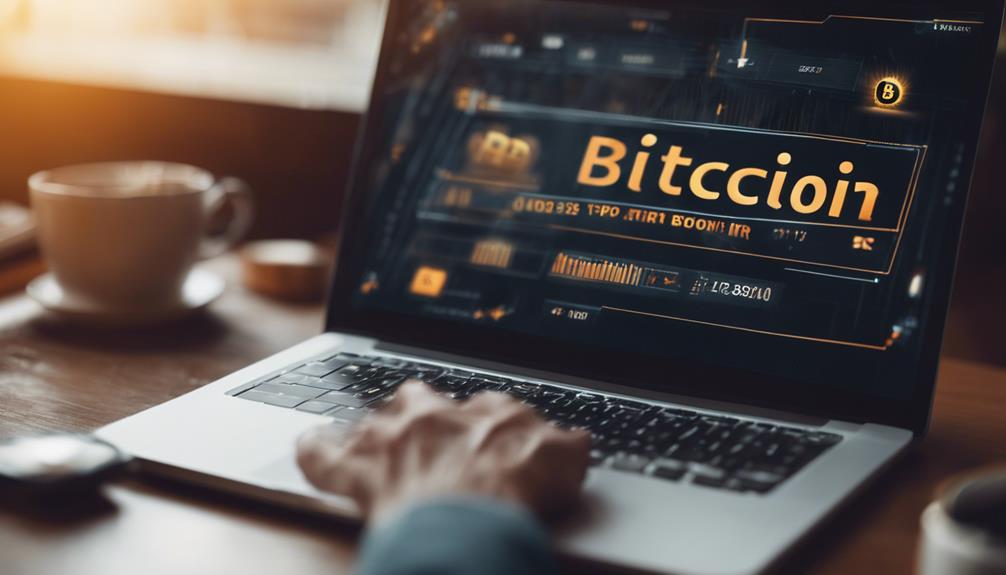
When initiating the Bitcoin purchase process within your Bitcoin IRA, proceed by placing an order through the custodian's platform. Confirm the transaction details and review the purchase amount in Bitcoin to guarantee accuracy. Additionally, verify the transaction fees associated with buying Bitcoin within your IRA account to understand the costs involved. It's vital to make sure that the Bitcoin purchased is securely stored within your IRA account to maintain its value and security.
After executing the purchase, monitor your Bitcoin investment within the IRA to track its performance and potential growth. Keeping an eye on the market can help you make informed decisions regarding your investment. By actively monitoring your crypto in a self-directed manner, you can stay informed about any changes in value and adjust your strategy accordingly. Stay vigilant and proactive in managing your Bitcoin IRA to make the most out of your investment.
IRS Guidelines and Regulations

How do IRS guidelines impact the purchase and ownership of Bitcoin within an IRA?
The IRS allows the use of self-directed IRAs to invest in assets like Bitcoin within retirement accounts. Specific regulations govern the buying and holding of Bitcoin in an IRA to guarantee compliance with tax laws. Understanding IRS rules is vital to avoid penalties and maintain the tax advantages associated with IRAs.
Compliance with IRS guidelines is necessary when purchasing Bitcoin in an IRA to safeguard your retirement savings and ensure that your investments align with regulatory standards. By following the IRS regulations regarding self-directed IRAs and Bitcoin investments, individuals can capitalize on the potential growth of cryptocurrency within their retirement accounts while staying within the boundaries of legal and tax compliance.
It's important to stay informed about IRS guidelines to make informed decisions and maximize the benefits of investing in Bitcoin through your IRA.
Consultation With Financial Advisors

When contemplating Bitcoin investments within your IRA, it's important to engage in consultation with financial advisors.
Advisors can offer expertise in selecting suitable investments and aligning them with your financial plan.
Their guidance can guarantee that your retirement portfolio incorporates Bitcoin effectively.
Advisor Expertise Selection
To navigate the complexities of Bitcoin investments in IRAs, selecting a financial advisor with specialized expertise in cryptocurrency is vital. A registered financial advisor can offer valuable insights into how Bitcoin can enhance your retirement savings within a crypto IRA. Expert guidance on portfolio diversification provided by these advisors can help optimize your investments.
Understanding the tax implications and long-term benefits of incorporating Bitcoin into your IRA is essential, and a knowledgeable advisor can assist in this process. Additionally, they can help align your risk tolerance with your investment goals, ensuring that you make informed decisions regarding Bitcoin in your IRA. It's important to choose an advisor who understands the nuances of cryptocurrency investments and can guide you towards maximizing your retirement funds.
Financial Plan Alignment
In discussing financial plan alignment, consulting with financial advisors plays an important role in ensuring that your investment goals are harmonized with your overall financial objectives. Here are four key reasons why consultations with advisors are essential for your Bitcoin IRA and retirement plan:
- Risk Assessment: Advisors help evaluate your risk tolerance, ensuring your investment aligns with your comfort level.
- Tax Efficiency: Understanding tax implications is essential for maximizing the benefits of your IRA.
- Diversification Strategies: Advisors can guide you on diversifying your portfolio effectively with Bitcoin.
- Long-Term Growth: Gain insights into the potential long-term growth of Bitcoin and how it fits into your retirement goals.
Benefits of Bitcoin IRAs
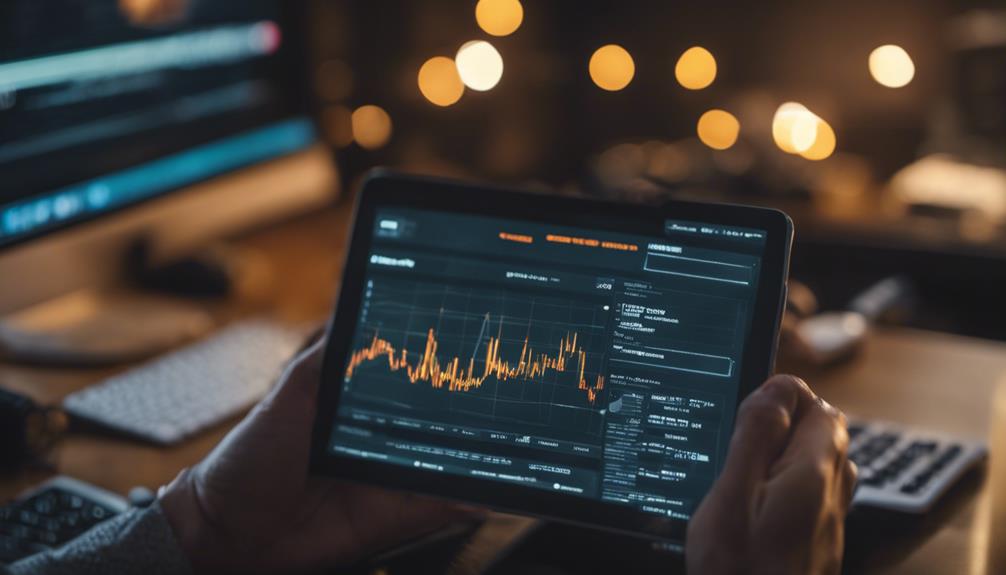
Bitcoin IRAs offer investors tax advantages similar to traditional and Roth IRAs, allowing for tax-deferred or tax-free growth. By including Bitcoin in your IRA investment portfolio, you can diversify from traditional assets like stocks and bonds, potentially enhancing your overall retirement strategy.
This diversification can help spread risk and capture the potential growth that Bitcoin offers as a digital asset. For those with a longer investment horizon and a higher risk tolerance, Bitcoin IRAs can be a valuable addition to their retirement planning.
It's important to trust in the process and understand the complexities involved, ensuring that the Bitcoin IRA provider you choose is reputable and prioritizes security. With proper due diligence, a Bitcoin IRA can offer you the opportunity to invest in the future of finance while benefiting from the tax advantages and potential growth it provides.
Risks of Bitcoin IRAs

Exploring the landscape of Bitcoin IRAs entails understanding and managing the inherent risks associated with market volatility and regulatory uncertainties. When considering Bitcoin IRAs, it's important to be aware of the potential pitfalls to protect your retirement funds effectively.
Here are four key risks to keep in mind:
- Market Volatility: The unpredictable nature of Bitcoin prices can lead to significant fluctuations, impacting the value of your IRA.
- Security Risks: Limited protection for Bitcoin holdings within IRAs exposes investors to potential security breaches and asset loss.
- Taxation of Cryptocurrencies: The uncertain tax treatment of cryptocurrencies in IRAs can add complexity and risk to your investment strategy.
- Fluctuations in Bitcoin Prices: The ever-changing value of Bitcoin can affect the overall worth of your Bitcoin IRA, influencing your retirement savings and financial objectives.
Being informed about these risks is important for making sound decisions when considering Bitcoin IRAs.
Considerations for Opening a Bitcoin IRA
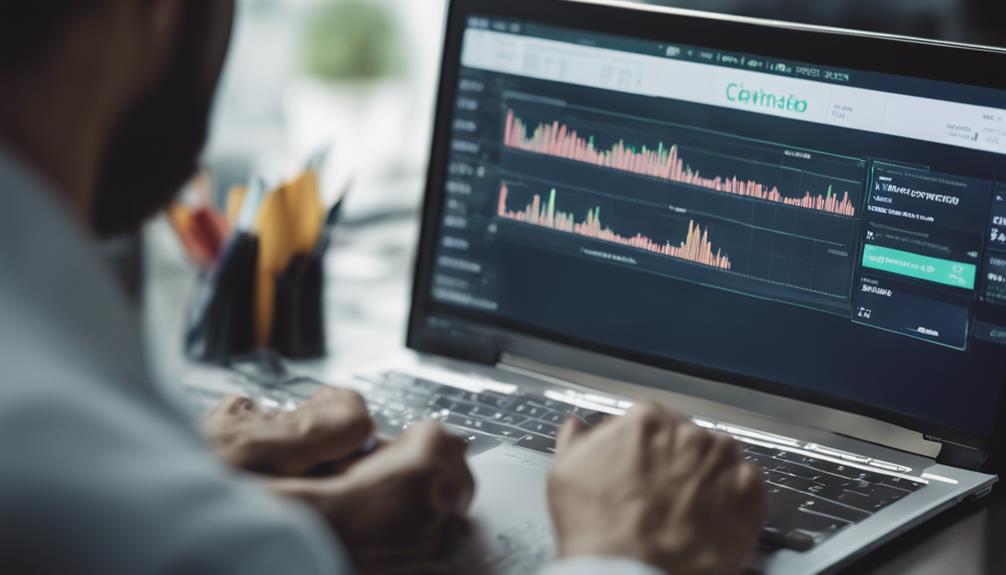
When delving into the domain of retirement planning with cryptocurrency, one must carefully consider key factors before setting out on the journey of opening a Bitcoin IRA. Bitcoin IRAs offer tax advantages similar to traditional and Roth IRAs.
To begin, finding a custodian for your Bitcoin IRA is essential. Aligning your investment goals with the custodian's services is vital to guarantee a smooth experience. Funding methods for a Bitcoin IRA vary and can include cash, checks, or direct deposits.
Once funded, the Bitcoin purchased in a Bitcoin IRA is securely stored within the IRA, offering peace of mind regarding its storage. However, it's essential to acknowledge that Bitcoin IRAs come with additional complexities compared to traditional retirement accounts, so being well-informed and prepared is key to successfully maneuvering this financial avenue.
Frequently Asked Questions
How Do I Buy Bitcoin in My Ira?
To buy Bitcoin in our IRA, we need to open a self-directed IRA with a custodian that allows cryptocurrency investments. Once our IRA is set up, we can fund it through contributions, transfers, or rollovers from existing retirement accounts.
After funding our IRA, we can purchase Bitcoin through the custodian's platform or exchange partner. The purchased Bitcoin will be securely stored within our IRA, offering tax advantages and potential growth within a retirement account.
Can I Buy Bitcoin in a Self-Directed Ira?
Yes, we can buy Bitcoin in a self-directed IRA. It allows for diversifying our investments beyond the usual options.
However, it's important to be aware of IRS regulations and guidelines governing Bitcoin purchases in IRAs. Before diving in, we need to carefully weigh the risks and benefits of holding Bitcoin in a self-directed IRA.
It's all about expanding our financial horizons while maneuvering through the regulatory landscape.
How to Invest in Bitcoin Step by Step?
Investing in Bitcoin step by step involves:
- Finding a reliable IRA custodian,
- Completing necessary forms,
- Funding your account, and
- Purchasing Bitcoin through approved methods.
Once acquired, securely store your Bitcoin within the IRA for potential growth and tax advantages.
Following these steps can help you navigate the process of investing in Bitcoin within your IRA while maximizing its benefits for long-term financial goals.
How to Buy Bitcoins for Dummies?
When it comes to buying bitcoins for dummies, we've got your back!
It's all about finding a user-friendly platform, setting up an account, and making your purchase. Keep it simple and secure.
Remember to do your research, avoid scams, and store your bitcoins safely.
We'll guide you through the process step by step. Let's get started on this exciting journey together!
Conclusion
To sum up, purchasing Bitcoin in your IRA can be a smart investment strategy for the future. By following the steps outlined in this guide, you can navigate the process with confidence and ease.
Just remember, as with any investment, it's important to consult with financial advisors and stay informed on IRS regulations.
So, take the leap and diversify your retirement portfolio with the digital currency that's shaking up the financial world.
Nancy oversees all content creation at The Liberty Portfolio. Her exceptional skill in translating complex financial concepts into clear, actionable advice makes her an invaluable asset to the team. Under her guidance, our content is informative and engaging, ensuring that readers from all backgrounds can understand and apply our advice. Nancy’s leadership in the content team ensures that our educational materials meet high standards of clarity and accuracy.
-

 IRA Investing3 months ago
IRA Investing3 months agoUnderstanding Your Individual Retirement Account (IRA): Types, Investments, and How It Works
-

 Bitcoin IRA3 months ago
Bitcoin IRA3 months agoBitcoin IRA Gold: Secure Your Retirement Savings
-

 IRA Investing3 months ago
IRA Investing3 months agoHow Are Roth IRAs Invested?
-

 IRA Investing3 months ago
IRA Investing3 months agoIRA Investing Basics
-

 Bitcoin IRA3 months ago
Bitcoin IRA3 months agoEthereum IRA: Invest in Crypto with Your Retirement Fund
-

 Gold IRA3 months ago
Gold IRA3 months agoDiscover the Advantages of a Gold Retirement Account
-

 Bitcoin IRA3 months ago
Bitcoin IRA3 months agoIs Bitcoin IRA Tax Free?
-

 Bitcoin IRA3 months ago
Bitcoin IRA3 months agoUltimate Guide to Crypto IRA Investment Options













